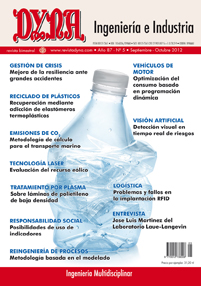THERMOPLASTIC ELASTOMER ADDITION FOR RECOVERING RECYCLED PLASTICS. MECHANICAL AND THERMAL CHARACTERIZATION
Keywords:
Degradation, Recovery, ABS, SEBS, Injection, Processed, Mechanical characterization, Thermal characterization, Degradación, Recuperación, Inyección, Reprocesado, Caracterización mecánica, Caracterización térmica.Abstract
Recovery of recycled acrylonitrile–butadiene–styrene (ABS) through mixing with styrene-ethylene/butylene-styrene (SEBS) has been studied in this paper. To simulate recycled ABS, virgin ABS was processed through 5 cycles, at extreme processing temperatures, 220ºC and 260ºC. The virgin ABS, the virgin SEBS, the recycled ABS and the mixtures were mechanically and thermally characterized after the various cycles of reprocessing in order to evaluate their corresponding properties and correlate them with the number of cycles undergone.The results show that tensile strength of ABS remains practically constant as the number of reprocessing cycles increases, while in the material injected with SEBS the tensile strength decreases. Concerning the Charpy notched impact strength, the values of the ABS reprocessed at 220ºC remain more or less unchanged, while the values for 260ºC show a significant decrease. The adhesion of the SEBS causes, in both cases, an increase in impact strength. DSC techniques enabled us to observe how the glass transition temperature (Tg) remains more or less constant regardless of the number of cycles or the temperature, whereas the crosslinking is much greater in the samples reprocessed at 260ºC.As conclusion, it is suggested that the people who works handling and dealing with plastic that, when possible, use low temperatures of transformation of ABS instead of high temperatures. It is also recommended to recycle the ABS to those who work with it; to use 5% of SEBS added to the recycled ABS to recover the possible loss of properties.Downloads
Published
2012-09-01
Issue
Section
ARTICULOS

